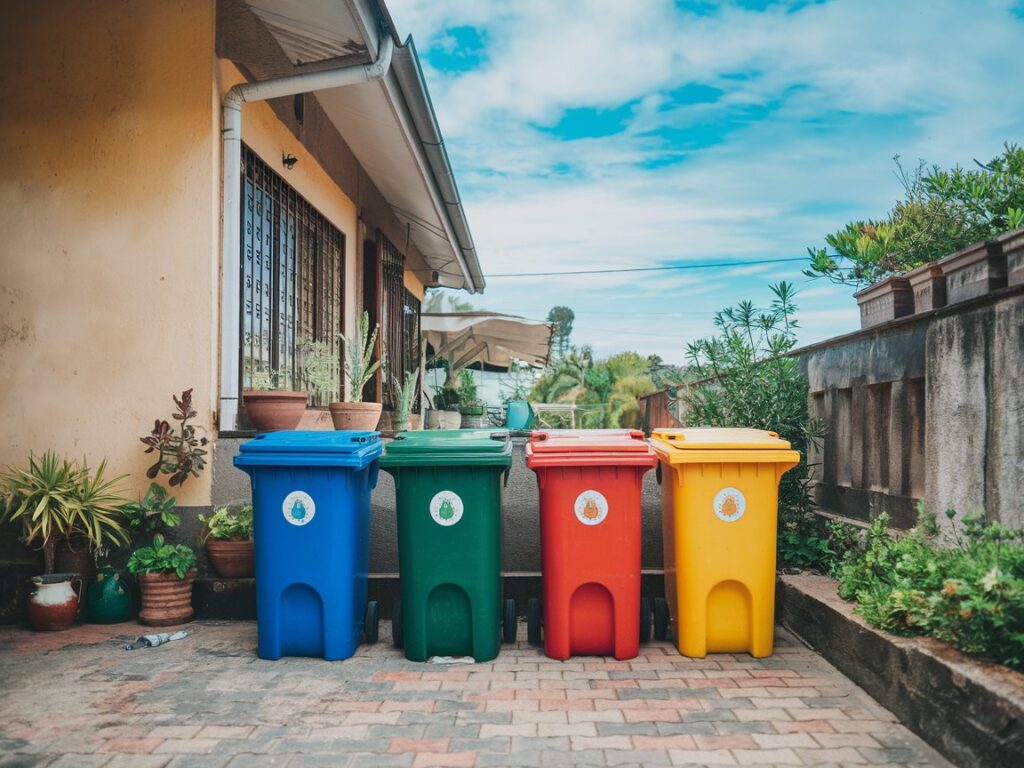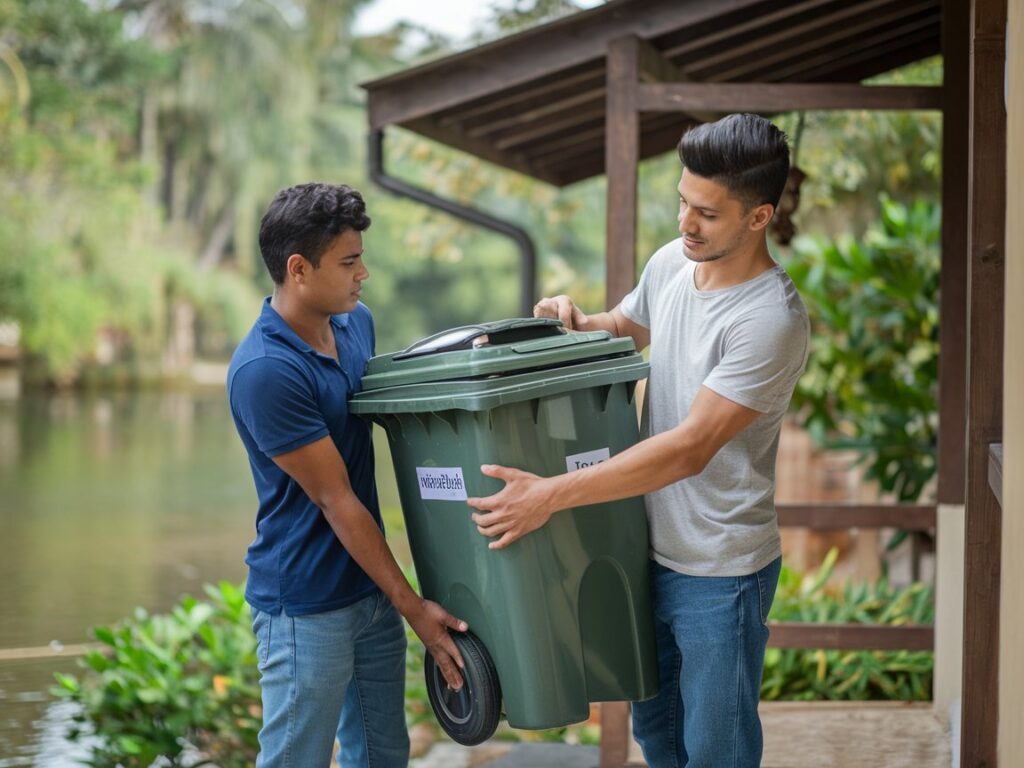Waste Management for Camp/Rig Crew Accommodation: Ensuring Hygiene and Sustainability in Catering and Operations

Effective waste management is essential for maintaining hygiene, safety, and sustainability in camp and rig accommodations. These remote locations, often housing hundreds of crew members, generate significant amounts of waste, especially from catering services. Proper waste disposal and recycling practices not only help prevent environmental contamination but also protect the health and morale of the crew. In this article, we will explore the importance of waste management in camp and rig settings, the challenges posed by remote environments, and the best practices for efficient and sustainable waste handling.

Importance of Waste Management in Camps and Rigs
Waste management plays a vital role in ensuring that camp and rig operations run smoothly. With crews working in isolated environments for extended periods, effective waste disposal directly impacts the living conditions, health, and safety of the workers. Additionally, in catering services, food waste, packaging materials, and kitchen scraps can accumulate quickly, requiring regular and efficient disposal to maintain hygiene and prevent the attraction of pests.
- Health and Hygiene:
Improper waste disposal can lead to the spread of harmful bacteria, bad odors, and contamination of living spaces. This is particularly critical in catering services, where food waste can attract pests, leading to foodborne illnesses and unsanitary conditions. Maintaining a clean and organized waste disposal system helps protect the health and hygiene of the crew. - Environmental Protection:
Camps and rigs are often located in environmentally sensitive areas such as deserts, forests, or offshore locations. Poor waste management can result in pollution of local ecosystems, including land, water, and air. By implementing environmentally conscious waste disposal methods, these operations can minimize their ecological footprint and protect surrounding habitats. - Compliance with Regulations:
Waste management in camps and rigs must adhere to strict environmental and health regulations. These may include guidelines for hazardous waste disposal, recycling, and water treatment. Non-compliance can result in hefty fines and operational disruptions, making it crucial for waste management systems to meet all legal requirements. - Crew Morale and Comfort:
A clean, well-maintained environment contributes to crew morale and overall comfort. Accumulated waste, unpleasant odors, or visible pollution can lead to frustration and discomfort among crew members. Effective waste management helps ensure that living quarters, dining areas, and workspaces remain pleasant and conducive to productivity.
Challenges of Waste Management in Remote Camps and Rigs
Managing waste in remote locations presents unique challenges due to their isolation, limited resources, and environmental sensitivity. These challenges must be addressed to maintain efficient and sustainable operations.
- Limited Access to Waste Disposal Facilities:
Remote camps and rigs are often far from traditional waste disposal facilities, making regular waste removal difficult. Waste must often be stored on-site for extended periods before it can be transported to appropriate disposal locations, which requires careful planning to avoid overflow and contamination. - Diverse Types of Waste:
Camps and rigs generate a wide range of waste types, including food waste, packaging materials, hazardous substances (like chemicals and oils), and recyclables. Each type of waste requires specific disposal methods, which can be challenging to manage in isolated settings where specialized facilities are unavailable. - Pest Control:
Waste, especially food scraps and organic materials, can attract pests such as rodents, insects, and birds. In remote locations, controlling pest populations is critical to maintaining hygiene and preventing infestations, which can disrupt operations and pose health risks to the crew. - Wastewater Management:
Camps and rigs also produce significant amounts of wastewater from catering, cleaning, and sanitation processes. Proper treatment and disposal of wastewater are essential to prevent contamination of local water sources, especially in offshore or environmentally sensitive areas.
Best Practices for Waste Management in Camps and Rigs
To overcome the challenges of waste management in remote environments, it is essential to implement a comprehensive waste management plan that includes prevention, disposal, and recycling strategies. Here are some best practices for waste management in camp and rig settings:
- Waste Segregation:
One of the first steps in effective waste management is the segregation of waste at the source. Setting up clearly labeled bins for different waste types—organic, recyclable, hazardous, and general waste—ensures that materials are properly separated and can be disposed of or recycled according to their specific requirements. - Composting Organic Waste:
Organic waste, such as food scraps from catering services, can be composted on-site to reduce the volume of waste requiring transportation. Composting helps reduce the strain on waste disposal systems and can be used to enrich local soil, particularly in land-based camps. This process is environmentally friendly and helps minimize the camp’s ecological footprint. - Recycling Programs:
Recycling should be a key component of any waste management system in remote camps and rigs. Recyclable materials such as plastic, glass, and metal can be collected and stored until they can be transported to recycling facilities. By reducing the amount of waste sent to landfills, camps can lower their environmental impact and promote sustainability. - Hazardous Waste Handling:
Hazardous materials such as chemical containers, batteries, and used oil require specialized disposal methods. These substances must be stored in designated, secure containers to prevent leakage or contamination, and transported by authorized waste management services for safe disposal. - Efficient Waste Transportation:
Since remote camps often lack immediate access to disposal facilities, efficient waste transportation systems are essential. Waste should be regularly removed from the camp and transported to the nearest disposal or recycling facility. Coordinating transportation schedules and using specialized waste storage systems, such as compactors, can reduce the frequency of waste removal trips and minimize costs. - Wastewater Treatment Systems:
Camps and rigs should have reliable wastewater treatment systems in place to handle greywater from showers, kitchens, and cleaning, as well as blackwater from toilets. These systems help purify wastewater, ensuring it meets environmental standards before being released into the environment. In some cases, treated water can be recycled for non-potable uses, such as irrigation or cleaning. - Staff Training and Awareness:
Training staff in proper waste disposal methods is essential for the success of a waste management program. All crew members should be aware of the importance of waste segregation, recycling, and proper disposal practices. Regular training sessions can help reinforce the waste management policies and ensure compliance. - Pest Control Measures:
To prevent pests from being attracted to waste, all waste storage areas should be pest-proof. This includes using sealed containers, regularly cleaning waste disposal areas, and implementing a routine pest control program to monitor and mitigate pest activity. Effective pest control is crucial in maintaining hygiene and preventing infestations in catering areas. - Minimizing Waste Generation:
An important aspect of waste management is reducing the amount of waste generated in the first place. Camps and rigs can adopt strategies such as using reusable containers, reducing packaging, and planning meals more efficiently to minimize food waste in catering services. Encouraging crew members to adopt waste-reduction practices can also help limit the overall waste produced.
Sustainable Waste Management: The Future of Remote Operations
As environmental concerns continue to grow, sustainable waste management practices are becoming increasingly important in camp and rig operations. Incorporating sustainability into waste management not only benefits the environment but also enhances operational efficiency and compliance with regulations.
- Use of Eco-Friendly Products:
Camps and rigs can reduce waste generation by using eco-friendly products such as biodegradable packaging, reusable containers, and sustainable catering supplies. Switching to environmentally responsible materials helps decrease the amount of non-biodegradable waste and supports global sustainability efforts. - Energy Recovery from Waste:
Some camps are exploring ways to generate energy from waste through methods such as incineration or biogas production. These technologies allow camps to convert waste materials into energy, reducing the need for external fuel sources and minimizing the volume of waste sent to landfills. - Zero-Waste Initiatives:
Forward-thinking camps and rigs are adopting zero-waste initiatives, which aim to reduce, reuse, and recycle as much waste as possible. This approach not only minimizes the environmental impact of waste but also promotes resource efficiency and reduces operational costs in the long term.
Conclusion
Waste management is a critical aspect of camp and rig operations, particularly in the context of catering services where food waste and packaging materials are generated in large quantities. By implementing best practices such as waste segregation, composting, recycling, and proper handling of hazardous materials, camps can maintain hygiene, protect the environment, and ensure compliance with regulations. Sustainable waste management practices, including the use of eco-friendly products and energy recovery systems, are paving the way for a cleaner, more efficient future in remote operations.